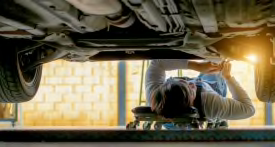You've just bought a used car. Before you signed the paperwork, you already checked its vehicle information number (VIN) with the National Highway Traffic Safety Administration, at nhtsa.gov/recalls, for any outstanding recalls.
But now that the car is yours, how do you make sure you find out about any recall that might be issued in the future?
There are several steps you can take to protect yourself so that you can get critical safety problems fixed free of charge in a timely fashion:
Update Your Registration
Make sure your vehicle's registration is up to date, with your correct mailing address and the vehicle's location, says Wade Newton, spokesman for the Alliance of Automobile Manufacturers trade group: "That's because automakers use state registration data to send out notifications by mail, as required by the National Highway Traffic Safety Administration." If they don't have your correct address, you might not receive any recall notices.
Subscribe to Email Alerts
You can subscribe to email alerts from NHTSA. On the subscription page, enter your email address and select the year, make, and model of the vehicle(s) you want to receive updates for. NHTSA will alert you when a manufacturer reports a new recall for the same brand and model year. It will not tell you whether your specific vehicle is involved in the recall, however.
Register With Carfax
Carfax offers a free recall alert service that is specific to your individual vehicle. Register your vehicle at Carfax's Vehicle Recall Check page and the company will send you a notification as soon as a new recall is reported. You don't even need to know your vehicle's VIN—you can register with just your license plate info. "Carfax gets all its recall data directly from the manufacturers," says company spokesman Jim Sharifi. "Users are alerted via email, or through the myCarfax app if it is installed on their Apple or Android device." Users will also get notifications of any unresolved recalls when they first register.
Inform the Manufacturer
You can also register your car directly with a manufacturer, although not all automakers use this information to notify owners about newly issued recalls. For example, Toyota says it will send recall notices to owners who register their car at the Toyota Owners page, but a Volkswagen spokesperson told CR that its Know Your Volkswagen site does not notify customers about new recalls that have been issued.
Some places are making an effort to help consumers stay up to date. In Maryland, drivers are alerted to any outstanding recalls whenever they renew their vehicle's registration. As part of a pilot program with NHTSA, the Maryland Department of Transportation says it has helped more than 150,000 vehicle owners resolve unrepaired recalls. NHTSA announced earlier this month that it's making funds available for other states that want to try a similar program.
"We're eager to see as many states as possible use innovative approaches to notify consumers of open recalls, like Maryland has," says William Wallace, a safety policy advocate at Consumer Reports. "This is especially important since some manufacturers don't give consumers the chance to sign up for company recall alerts."
You should also periodically check your VIN on the NHTSA website. That's because hundreds of recalls are issued every year—813 in 2017 (the most recent year with complete data) alone, affecting 30.7 million cars, according to NHTSA. The agency estimates that only about two-thirds of recalls ever get fixed.
The problem is more severe for used-car buyers. Even though new cars cannot be sold with an unrepaired recall, there is no similar federal law for used cars. That means dealers are not required under federal law to check for open recalls or to fix potentially deadly safety defects before they sell a vehicle.
Stay informed about recalls that might affect your vehicle using our Car Recall Tracker. Create a free account now to become a CR member.















